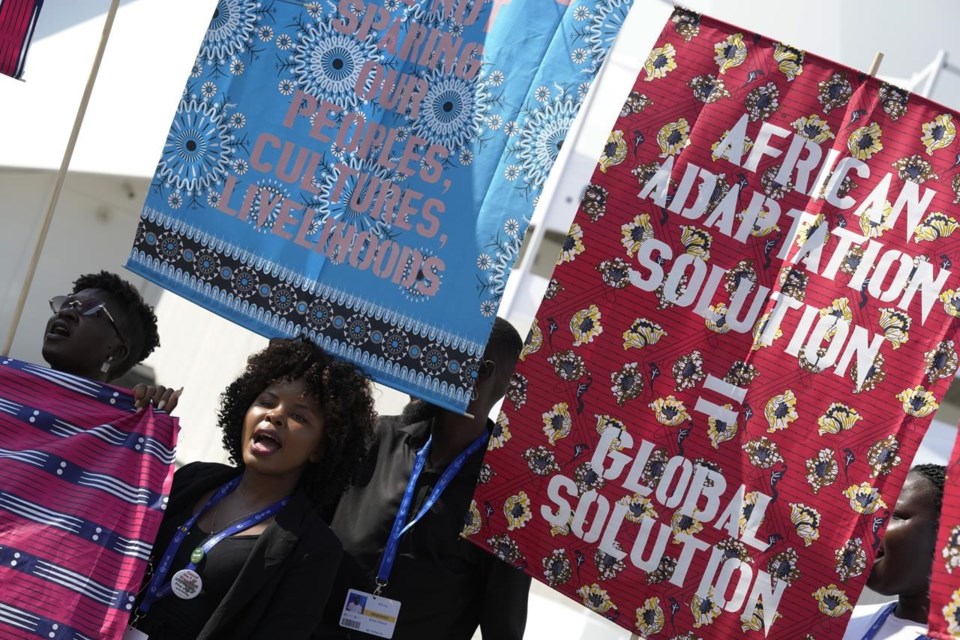DUBAI, United Arab Emirates (AP) ā As United Nations climate talks enter their second week, negotiators who are largely focused on how to curb climate change have another thing on their plates: how to adapt to the warming that's already here.
Discussions for what's known as the Global Goal on Adaptation ā a commitment made in the 2015 Paris Agreement to ramp up the world's capacity to cope with climate-fueled extreme weather ā are being overshadowed by negotiations on how the world is going to slash the use of fossil fuels, causing frustration among some climate campaigners in the most vulnerable countries.
Officials and activists from climate-vulnerable nations are pushing for more money to help them deal with scorching temperatures, punishing droughts and deluges and strengthening storms made worse by global warming. Major fossil fuel-emitting countries need to pay vulnerable, developing countries being battered by these events, experts and officials say, to help them avoid catastrophic humanitarian and economic losses.
"The problem is the fact that adaptation is actually the second long long-term goal of the Paris agreement,ā said South Africa-based Amy Giliam Thorp of climate think-tank Power Shift Africa. The first goal is a commitment to curb warming to 1.5 degrees Celsius (2.7 degrees Fahrenheit) since pre-industrial times.
Climate talks have already pledged millions to deal with the aftereffects of extreme weather events fueled by climate change as part of a , and over a hundred nations promised to triple renewable energy production globally.
Adaptation hasn't seen similar commitments at the talk so far. At a protest Friday calling for more money for adaptation, climate activist Evelyn Achan from Uganda said that āour countries, our communities are suffering so much.ā
āWe donāt have the money to adapt to the climate crisis and yet we do not cause the climate crisis, we are least responsible for the climate crisis. So, we're demanding for leaders to put in place adaptation finance,ā she said.
Observers say a goal for adaptation is likely to be decided at the summit, but as things stand, itās set to be only a fraction of what some nations are calling for.
At plenary remarks on Wednesday, COP28 President Sultan al-Jaber said adaptation āis a key element of climate action" and urged countries to āconsider how we can make real progress to address the adaptation finance gapā between whatās been promised and whatās needed.
But Ani Dasgupta, the CEO of the World Resources Institute said he's āconcernedā about what will happen to adaptation goals at COP28. āNot much is there,ā he said. Dasgupta said he had expected some discussions on adaptation to be ongoing at this stage of climate talks.
āOne would have expected to see some visionā with regards to adaptation, said Dasgupta. According to him, negotiators couldnāt agree to something on adaptation that they could give to the ministers. āThatās a worrying sign, so it goes with a blank slate.ā
Dasgupta feels that as things stand there is a chance that fossil fuel phaseouts and adaptation goals might be used as a tradeoff on the high tables of global climate diplomacy. āBoth of them are needed,ā he said.
Mary Friel, Climate Policy lead at the International Federation of Red Cross and Red Crescent Societies said ānot moving forward on adaptation would be a major failure.ā
A U.N. report found that developing countries need nearly $400 billion per year to prepare for climate change but only $21 billion was given in 2021. The report also said that an additional $194 to $366 billion is needed with every passing year.
And the longer it takes to act on giving money adaptation, the higher the costs will be in future, Power Shift Africaās Thorp said.
Negotiations on climate adaptation have been āincredibly frustratingā said Teresa Anderson, global lead of climate justice at Action Aid International, who's in Dubai, United Arab Emirates for the climate talks. āThe negotiations havenāt matched the urgency and pace and the type of ambitious commitments we need to see."
The trouble is that adaptation money doesnāt give funders a return on investment, she said.
āRich countries see mitigation action in their own interest. Wherever it happens in the world, itās going to benefit everyone, even in the global north. Adaptation efforts and finance will only benefit people in the global south," Anderson said. āThe only reason they (rich countries) apparently want to give climate finance is if itās going to help themselves.ā
Rishikesh Ram Bhandary, who tracks climate finance at the Boston University Global Development Policy Center, added that the money that has been earmarked for adaptation is also not getting out the door fast enough.
It's having real-life implications for people living on the frontlines of climate change.
Tiwonge Gondwe, a small-scale farmer who grows groundnuts, pumpkins, maize and other crops in Malawi, which is susceptible to droughts and food insecurity, said the land is becoming less fertile each year because of global warming.
āI have never received any funding from my government saying this is the mechanism to adapt to climate change,ā she said. āWe donāt have food, and itās increasing hunger and poverty in my country. We need leaders to act now.ā ___
Associated Press journalists Malak Harb and Seth Borenstein contributed. ___
Follow Sibi Arasu on X, formerly known as Twitter, @sibi123 ___
Associated Press climate and environmental coverage receives support from several private foundations. See more about APās climate initiative . The AP is solely responsible for all content.
Sibi Arasu (), The Associated Press


